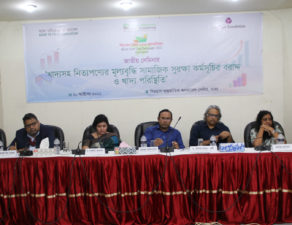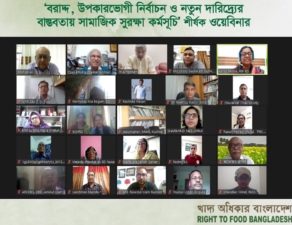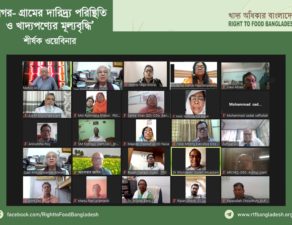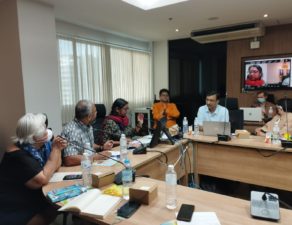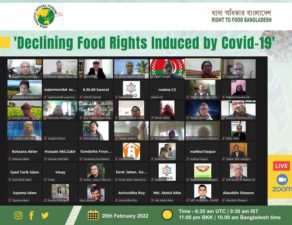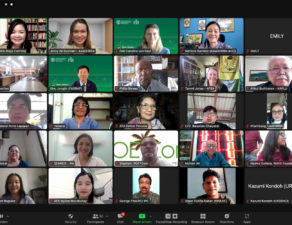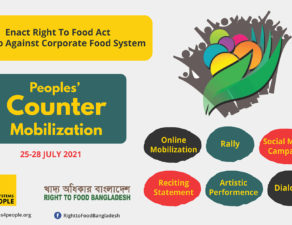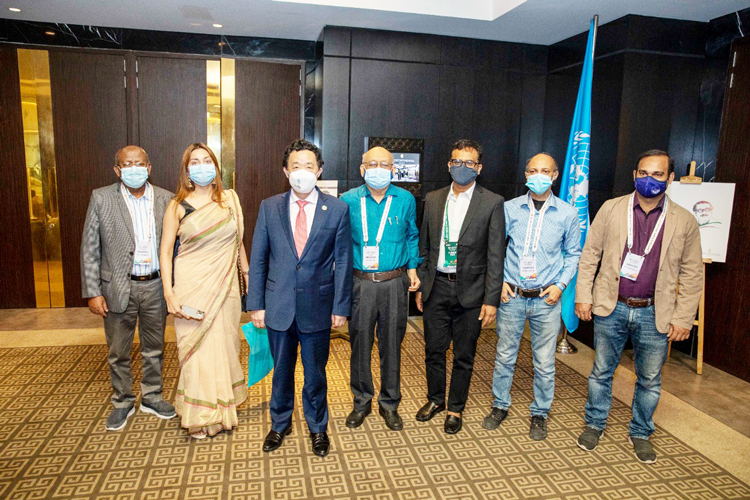
Dialogue with Qu Dongyu, DG, FAO
Right to Food Bangladesh (RTF BD)
Delivered by Mohsin Ali,
General Secretary, Right to Food Bangladesh (RTF BD) and Executive Director, WAVE Foundation
Honorable Director-General of FAO,
Distinguished Guests, CSO Representatives and Participants
Ladies and Gentlemen
Very good afternoon to you all!
I am pleased to join you all here on the occasion of 36th session of APRC on behalf of Right to Food
Bangladesh – a network of large number of CSOs, farmer’s, women’s and youth organizations, striving to ensure Right to Food and Nutrition for all through conducting lobby and advocacy to accelerate the ‘Legal Framework on Right to Food’ in Bangladesh. Alongside the network is working on agriculture, safe food, land and water. Today I am going to briefly highlight some issues, challenges and opportunities for the future of agriculture.
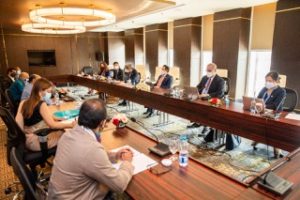
The COVID-19 pandemic has caused adverse and disproportionate impacts on Bangladesh’s diverse section of population. Vulnerabilities and inequalities have increased. However, Covid-19’s waves of destruction seems to be fading but it has inflicted their own kind of despair on humanity, imposing a destructive impact on Bangladesh’s socio-economic fabric. Particularly the whole food system including agriculture sector is affected by the Covid-19. According to a recent FAO report titled ‘Asia-Pacific Food Security and Nutrition Review-2021’ – Bangladesh is one of the states of acute food insecurity in the Asia-Pacific region, where a total of 52 million people that actually 31.9 % of the total population suffer from moderate to severe food insecurity. This has been a stumbling block in achieving SDG 1 & 2.
It is evident that the green revolution commenced in the decade of 1960s proved to be environmentally unsustainable agricultural practices which has caused adverse impact on soil, land, water and other natural resources endangering ecosystem and biodiversity in South Asia region because of using excessive chemical fertilizer and pesticides, uncontrolled and unsustainable irrigation system. Covid -19 has taught us that we need to return back to Agro ecology and it can be a solution for promoting small-scale farmers & family farming and achieving a sustainable, equitable, and secure food system leading towards establishing right to food for all and food sovereignty along with climate change adaptation and mitigation by enhancing resilience.
During COVID-19 pandemic, a large number of youth working in informal sectors lost their jobs and were compelled to return to their villages. Back in home, a large portion of these youth have been engaged in their family farming, willing to establish themselves as agro entrepreneurs. To capitalize this opportunity, these young agro entrepreneurs should be encouraged and supported by government initiatives and CSOs, who can eventually play substantial role in agricultural development and promote agro ecology.
The digitalization in agriculture value chain (production, harvesting, processing, marketing, financing) needs effective inclusion regardless of their gender, ages and ethnic identity. COVID-19 triggered supply and demand challenges. Meeting between the FAO Director-General and Civil Society Representatives of Bangladesh Wednesday, 9 March 2022, 14:30-15:15, InterContinental Dhaka, Bangladesh one of the biggest challenges in agricultural marketing for farmers is building business models to incorporate direct-to-consumer marketing. The other key challenge is creating an online presence through websites and social media pages to connect with and sell to customers. We must promote digitalization meaningfully for small scale farmers and farmer-friendly agriculture apps. Youth engagement in small scale farmer’s organizations can help taking full advantage of digitalization. Youth can contribute to bridge the knowledge gap and provide digital literacy to the farmers. To address gender gap, it is also important to address specific needs of women in receiving access and apply digital technologies in value chain.
Strategic Recommendations through APRC to our Government and FAO
If we want to move from Conventional agriculture to sustainable agriculture or climate resilient Agriculture, we need more government support in all areas in terms of Policy, institutional & necessary infrastructure support is very important.
To promote agro ecology we need to develop common understanding of agro ecology at local and national level, Invest in agro ecological research, Develop policies and governance mechanisms that can articulate agriculture, food, health, social, and environmental policies and Reinforce communication and alliances to bring representatives of farmers, other food producers, small scale processers, CSOs, researchers, and concerned citizens together to enhance the social movement for a sustainable food system.
An enabling policy and concrete action plan from government required to explore high potential of young agro entrepreneurs and fulfil their needs at every stage of agriculture value chain i.e. training, incubation, mentoring, start-up, credit support, market linkage and other areas.
RtF BD is constantly carrying out lobby and advocacy towards formulating the ‘Right to Food Act’ and to acknowledge Right to Food as a Human Right as part of the policy. Against this backdrop, FAO’s role in the promotion of the right to food for all and contribute to formulating a more strategic approach in the advancement of the right to food act in Bangladesh will be highly appreciated.
FAO needs to assist policy makers in planning to strengthen diverse section of agriculture, agro ecology along with trade and agricultural Policies to Support Small-scale Farmers and providing strategic direction to accelerate information technology, digitalization and innovation to meet SDG targets by 2030.
The RtF BD network emerged in 2015 following the ‘South Asia Right to Food- SARF Conference’ held in Dhaka, Bangladesh inaugurated by the Honorable Prime Minister Sheikh Hasina. Since the aftermath of Covid-19 pandemic has triggered similar impacts and challenges in the South Asian countries, we are taking initiatives to organize a conference by end of this year on ‘South Asia RtF and Sustainable Agriculture’. We cordially invite the honorable DG along with your Regional and National officials. The participation of Regional and National representatives at the event will be appreciated. Alongside CSOs across Asia and the Pacific involved with this process are humbly invited to the event.
For a better world with a sustainable future for our upcoming generation, we need better production, better nutrition, a better environment and a better life for all without leaving anyone behind with a view towards achieving all the SDGs within the expected timeline.


